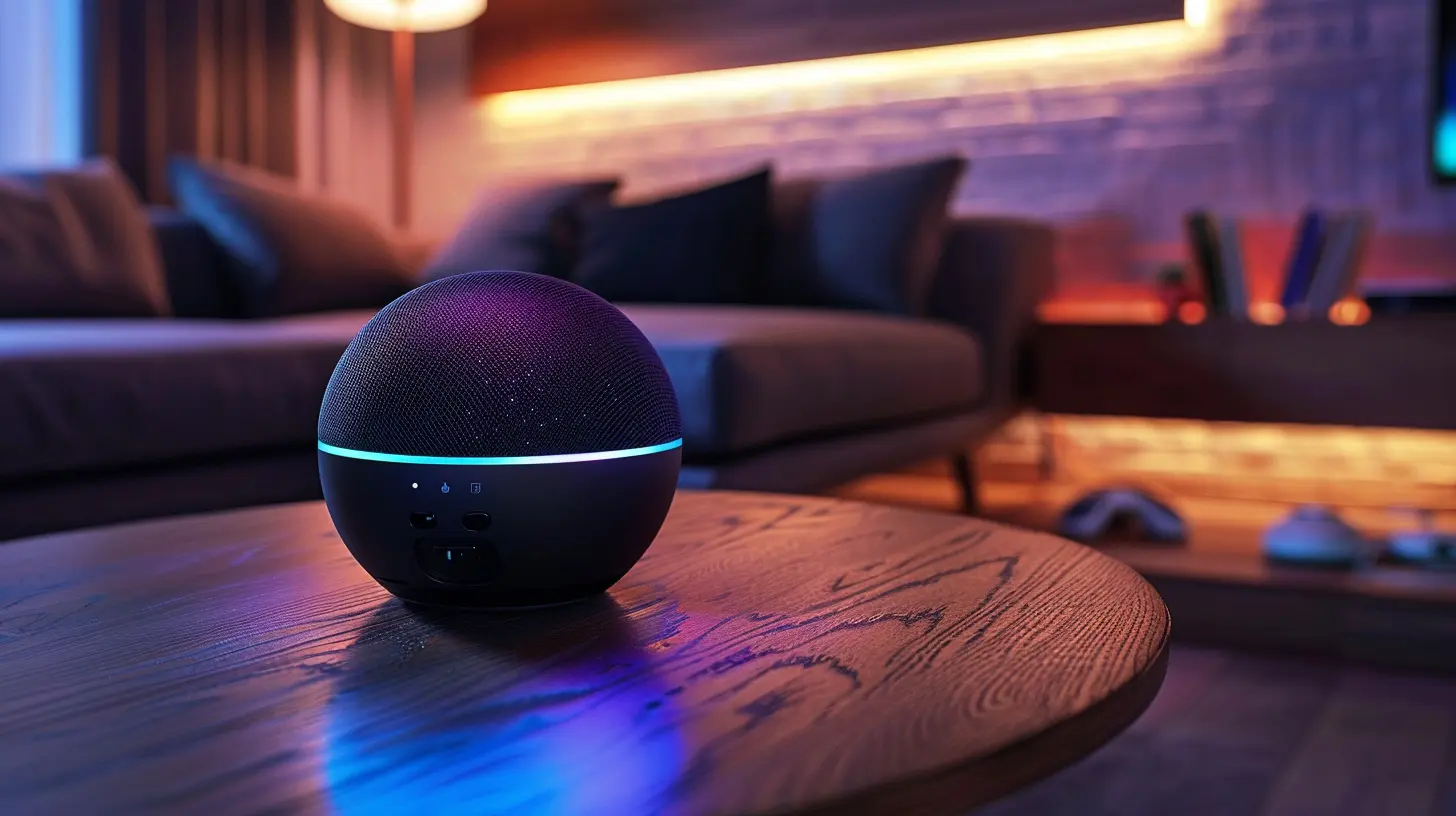Voice Assistants and Virtual Reality: The Next Step in Immersive Interaction
15 July 2025
In recent years, technological advances have transformed how we interact with the digital world. The rise of voice assistants like Alexa, Siri, and Google Assistant has brought convenience to our daily lives, while virtual reality (VR) has provided us with immersive experiences that were once the stuff of science fiction. Now, these two revolutionary technologies are on a collision course, and the results could change everything. Imagine navigating virtual landscapes or controlling digital environments with just your voice. Sounds pretty sci-fi, right?
Well, it's not as far off as you might think.
In this article, we're diving deep into how voice assistants and virtual reality might just be the peanut butter and jelly of the tech world—two separate entities that, when combined, create something truly amazing.

The Evolution of Voice Assistants
Before we jump into the future, let's take a quick trip down memory lane. Voice assistants were once nothing more than basic tools that could barely understand simple commands. Fast forward to today, and they have evolved into highly intelligent systems capable of understanding natural language, controlling smart home devices, setting reminders, streaming music, and even cracking jokes.What's more interesting is how AI-powered voice recognition has improved. Now, voice assistants can recognize accents, learn from user interactions, and even predict what you might need next. And the best part? They're becoming more conversational, making interactions feel less robotic and more like you're talking to a helpful friend.
But how does this relate to virtual reality?

Virtual Reality: A World Beyond Our Imagination
If voice assistants are the brains, then virtual reality is the body. VR transports you into fully immersive digital environments, allowing you to interact with 3D virtual worlds like never before. It's been used in gaming, training simulations, architectural walkthroughs, and even medical procedures.The thing about VR is that it’s incredibly immersive. You put on a headset, and boom—you’re in a different world. But here’s the catch: the way we currently interact with VR is still somewhat clunky. We use hand controllers or joysticks to navigate the environment, which can break the immersive experience. Wouldn’t it be great if there was a more natural way to interact with these virtual worlds?
Enter voice assistants.

The Perfect Marriage: Voice Assistants in Virtual Reality
So, how do voice assistants and virtual reality come together? Picture this: You're in a virtual environment—maybe you're walking through a futuristic city or exploring a haunted mansion. Instead of fumbling with buttons or controllers, you simply say, "Show me the map," and instantly, a map appears in front of you. Or imagine commanding elements of your environment, like opening doors or picking up objects, just by using your voice.This combination makes VR not only more immersive but also more intuitive. By integrating voice commands, we can eliminate the need for cumbersome physical controls, making the entire experience smoother and more engaging. It's like having a personal assistant in your virtual world, ready to respond to your every command.
Hands-Free Interaction
One of the biggest advantages of using voice assistants in VR is the potential for hands-free interaction. In a VR experience, your hands are often occupied holding controllers. But what if you could control menus, navigate maps, or interact with non-playable characters (NPCs) without lifting a finger? Voice commands offer that possibility.This not only makes VR more accessible to people with physical disabilities but also adds a layer of convenience that’s otherwise missing from the current VR experience. It's like unlocking a whole new dimension of possibilities.
Enhanced Immersion
In any virtual reality experience, the goal is immersion—making the user feel like they are truly inside the virtual world. Using voice commands can take this to the next level. For instance, imagine being in a survival game. You’re deep in the woods, and it’s getting dark. Instead of pulling up a menu to check your inventory, you simply say, "Check supplies," and a list of your items appears before your eyes. Or you're flying a spaceship, and with just a simple command, you can activate the thrusters or fire lasers.Now we’re talking real immersion.
Natural Conversations with NPCs
Another exciting possibility is using voice assistants to have natural conversations with non-playable characters (NPCs) in virtual environments. In many VR games or experiences, interacting with NPCs is often limited to pre-defined dialogue options. But what if you could actually talk to them, ask questions, and get real-time responses?Thanks to advancements in natural language processing (NLP), this is becoming more feasible. You could hold conversations with virtual characters, giving you the feeling that you're truly part of the story. This could be a game-changer not just for gaming, but also for VR-based training programs, educational applications, and even virtual meetings.

Real-World Applications of Voice Assistants in VR
It’s not just about gaming. The merging of voice assistants and VR has real-world applications that could revolutionize industries. Let's take a look at a few:1. Healthcare and Therapy
Virtual reality is already being used for medical training, pain management, and physical therapy. But add voice assistants into the mix, and the potential skyrockets. Doctors could navigate complex procedures in a virtual environment using voice commands, or patients undergoing therapy could control their virtual surroundings without needing to interact physically.Imagine a patient undergoing psychological therapy for PTSD in a VR environment. Instead of using controllers to interact, they could simply voice their feelings or ask for specific calming environments, making the experience more therapeutic and less stressful.
2. Education and Training
Education is another field primed for this tech combo. VR has shown promise in creating immersive learning environments, whether it's a historical simulation or a science lab. With voice assistants, students could ask questions and receive answers in real-time without needing to exit the virtual environment. It’s like having a tutor inside the VR world, guiding you along the way.In professional training, voice-enabled VR could simulate real-world tasks, from operating machinery to navigating complex business scenarios, allowing users to gain hands-on experience without real-world risks.
3. Virtual Meetings and Collaboration
As more businesses move towards remote working, VR is becoming a tool for virtual meetings and collaboration. Voice assistants could make virtual meetings more efficient by allowing users to schedule meetings, take notes, or even control presentation slides—all using voice commands. Picture yourself in a virtual meeting room, and instead of fumbling for the mute button, you just say “mute,” and voilà.This could also extend to creative industries. Designers, architects, and artists can manipulate elements of their virtual projects with voice commands, speeding up workflows and boosting creativity.
Challenges and Limitations
Of course, it's not all sunshine and rainbows. As exciting as the potential is, integrating voice assistants with VR comes with its share of challenges. Voice recognition technology is still prone to errors, especially in noisy environments (and let’s be honest, some VR games can get pretty loud). Ensuring that voice commands are recognized accurately in a dynamic VR world will require significant advancements in both software and hardware.Another limitation is latency. In fast-paced VR environments, even a slight delay in executing a voice command could be frustrating and break immersion. Developers will need to ensure that voice interactions are instantaneous and seamless.
Lastly, there’s always the privacy concern. Voice assistants are known to collect data, and when combined with VR, that’s a lot of information being shared. Users will need to trust that their data is being handled securely, which could be a major hurdle for widespread adoption.
The Future Is Closer Than You Think
So, where do we go from here? The integration of voice assistants and virtual reality is still in its early stages, but the potential is undeniable. Major tech companies are already experimenting with this combination, and it’s only a matter of time before these two technologies enter our daily lives in ways we can't yet fully imagine.As AI continues to evolve, voice assistants will become even more sophisticated, and VR experiences will become more interactive and lifelike. The line between the real and virtual worlds will blur, and our interactions with technology will feel more natural and intuitive than ever before.
Conclusion
Voice assistants and virtual reality are two of the most exciting technologies of our time. Separately, they’re impressive. Together, they have the power to revolutionize how we interact with digital environments. Whether it’s gaming, education, healthcare, or business, the fusion of these technologies promises a future where immersive interaction is not just possible—it’s the norm.And honestly, who doesn’t want to experience that?
all images in this post were generated using AI tools
Category:
Voice AssistantsAuthor:

Pierre McCord
Discussion
rate this article
2 comments
Solenne Carey
Exciting developments ahead! Voice assistants in VR will transform our experiences!
November 25, 2025 at 4:49 AM
Zyana McMurtry
This article highlights the transformative potential of integrating voice assistants with virtual reality (VR). By enabling hands-free control and more natural interactions, this synergy promises to enhance user experiences in immersive environments, making technology more accessible and intuitive. The future of VR could be revolutionized by voice-driven interfaces, paving the way for innovation.
July 30, 2025 at 4:19 AM

Pierre McCord
Thank you for your insightful comment! I agree that the integration of voice assistants with VR has immense potential to enhance user experiences and accessibility in immersive environments.


